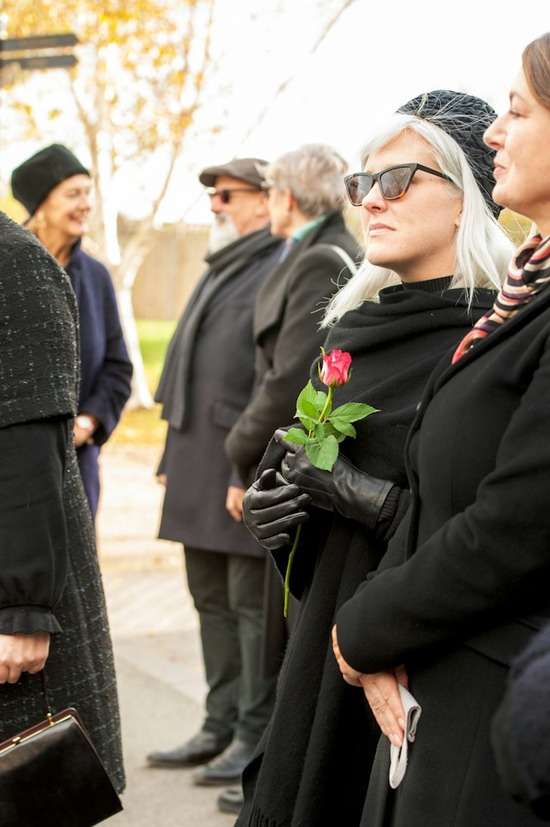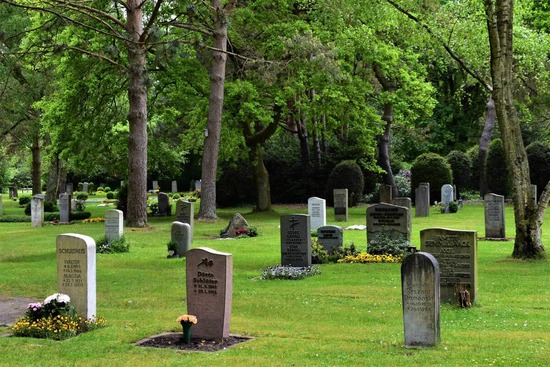Adventists consider death a sad effect of sin. It is a time for mourning and recognizing the fragility of life, and it should be regarded with the appropriate amount of somber respect for those it affects.
It is always difficult to face death, whether thinking about our own or that of someone we care about.
Adventists also look forward in faith to the resurrection at the Second Coming of Christ, knowing that the resurrection and eternal life with Jesus is a blessing to look forward to. Though we recognize that death is a sad occasion, there is a measure of comfort and peace we can hold onto as believers, knowing we will be reunited at Jesus’ return.
Let’s look more closely at these beliefs, and how members of the Seventh-day Adventist Church put them into practice:
- What Adventists believe about death
- Common Adventist burial practices
- Common funeral practices
- How Adventists support the bereaved
Let’s start with looking at the scriptural basis for how we view death.
What Adventists believe about death

Photo by Sandy Millar on Unsplash
You can read the official Fundamental Belief page about this topic, but here’s a summary.
Seventh-day Adventists believe that when a person dies, their body decomposes (Genesis 3:19) as they no longer have the “breath of life” (Genesis 2:7) in them. And while this breath of life returns to God, it is as if that person is in a state of unconsciousness. Like sleep, they are unaware of anything.
“For the living know that they will die; but the dead know nothing, and they have no more reward, for the memory of them is forgotten” (Ecclesiastes 9:5, NKJV).
No part of a dead person is active or aware—not the body, not any soul or spirit. They don’t exist in a spirit world that can contact living relatives.
The dead won’t know anything until Jesus Christ returns at the Second Coming and resurrects them to eternal life.
Because we believe this, we don’t believe anyone goes straight to heaven or hell right after they die. So our customs surrounding death don’t talk about or refer to death as a propelling step into heaven or hell. We refer to those who have passed on as “resting” in the grave.
Because they are at rest, Adventist funerals often include a hopeful undertone, despite grief being a natural and healthy thing to accompany a loss (Ecclesiastes 3:4). But our faith reminds us that Christ conquered death and promised He would return to take us all to heaven, defeating death forever (1 Corinthians 15:19-26).
The next thing a dead person will see is Jesus returning.
In light of these beliefs, let’s look at some Adventist burial practices.
Common Adventist burial practices
Officially speaking, Adventists don’t hold to one specific type of burial practice. We follow what most Christians do and bury or cremate those who have just died.
Burying the dead was a Jewish tradition (1 Kings 2:10, 1 Kings 15:24, 2 Kings 20:21) which was passed down to Christianity. 1
Cremation is also common and can be practical for many reasons. While the Bible doesn’t directly discuss it, it does give us an example of when cremation was employed. In 1 Samuel, we read of King Saul and his sons’ deaths during battle.
Most Israelites by this point were quite fed up with Saul and eager for David to become king. But the people of Jabesh Gilead, who Saul had once saved, remembered him favorably (1 Samuel 11). Out of respect, they “took the body of Saul and the bodies of his sons from the wall of Beth Shan; and they came to Jabesh and burned them there. Then they took their bones and buried them under the tamarisk tree at Jabesh, and fasted seven days” (1 Samuel 31:12-13, NKJV).
These bodies were likely mutilated and unpleasant to behold, and burning them was a sign of respect.
As far as our beliefs are concerned, the burial process is mostly due to practical and sentimental reasons. While there may be symbolic meaning within the burial practices, there is no lasting significance for the departed person and it will make no difference in how the events of the resurrection take place.
No matter how the deceased was put to rest, they will still be raised to life when Jesus returns. So Adventists leave the decision of burial or cremation up to the individuals and families.
This perspective is also behind the reasons many Adventist funerals are considered fairly simple and practical, rarely prioritizing costly or elaborate displays. Generally, we’d rather focus on supporting and comforting those who are grieving.
Common funeral practices in Adventist communities

Photo by The Good Funeral Guide on Unsplash
Typically, when someone passes away, the immediate family gets to work preparing a funeral. Depending on circumstances, a funeral service could be held anywhere between a few days or a few weeks from the time of death.
It’s common for Adventists to avoid holding funerals on Sabbath, mostly because it involves a tremendous amount of work, planning, travel, and accommodations. On Sabbath, Adventists make it a priority to rest from everyday activities and focus on spending time with God.
Celebration of life services
Many Adventist communities also hold “celebration of life” or memorial services, whether in addition to a formal funeral or in place of it. These could be held up to a few months after the person’s death.
Generally, these services take the place of funerals if the body was cremated or the funeral has to be delayed past the reasonable timeframe for burial.
Or in the case of larger Adventist communities, a family might hold a small graveside service for close friends and family, and a later memorial service to include others in fondly remembering their loved one.
Viewings
The day before or day of a funeral, Adventists might hold a viewing, or a window of time (usually a few hours) when friends and family can come to the funeral home or church and speak with the relatives of the deceased. This may be an open-casket occasion, or the family may display pictures.
Funerals

Photo by The Good Funeral Guide on Unsplash
The funeral service typically takes place in a church or the funeral home. People attending might wear dark clothing and typically little or no jewelry, because of some of our beliefs about what we wear. The service often includes music, prayer, a reading of the obituary, Scripture readings, a few words from the pastor, and a benediction.
The pastor’s homily tends to focus on the hope we have in God and His plan, because all Adventists look for the day when Jesus returns at the Second Coming, and we’ll see our loved ones again in heaven. The whole service tends to have a hopeful feel, rather than one of abject sorrow, although the event is not without sadness.
The service doesn’t tend to be long—30 minutes or so, though it can depend on how many people share memories.
If the family chooses to have a graveside service, everyone will then drive to the gravesite, where the minister will often have a brief graveside service. Participants will sprinkle flowers over the casket, and it will be lowered into the ground.
In some cases, the family may provide a meal after the burial service for guests.
Even though this is a general blueprint for an Adventist funeral, there are countless variations you can expect to see. It depends on the family’s preferences and the individual’s requests, as long as it doesn’t conflict with the church’s official beliefs.
It also varies widely depending on the region of the world you live in. All cultures have their own traditions within Adventism, and it’s important to remember they may not look exactly like what we just described.
A funeral is an unhappy time, and Adventists seek to provide comfort for grieving loved ones. Let’s talk about that next.
How Adventists support the bereaved

Photo by Priscilla Du Preez 🇨🇦 on Unsplash
Funerals are a difficult time for the loved ones, who bear the sadness and often the financial burden as well.
Sometimes, the deceased’s family prefers to grieve privately, and their wishes should be respected. But as much as possible, Adventists try to help their friends during this time of sadness. They may send flowers or gifts to the family’s home, to let them know they’re thinking about them and praying for them.
Other times, church members may send food to the family. A funeral involves a lot of planning, and sometimes the last thing the bereaved want to think about is deciding what they’re going to eat, or what they’ll serve for those visiting from out of town. It can be an extra burden to have to organize and prepare those meals, so the local church family tries to help as much as they can.
Visiting the grieving members can also be appreciated, if they’re up to it. Sometimes the grieving family members need someone to talk to for various reasons: getting their mind off their sadness, having a friend to talk to about preparations, or having someone to comfort them and reassure them in a time that is overwhelmed with sorrow and uncertainty.
The most important thing you can do when an Adventist you know loses a family member is do your best to understand what their individual needs might be, and try to help them in accordance with those needs. Find ways to sincerely let them know that you sympathize with them.
Death of a loved one is hard to cope with, even for Christians like Adventists who know we’ll see our Christian family members after the resurrection.
While we make sure not to dismiss this temporal sorrow we experience after a loss, we do recognize that it’s important to hold fast to that hope Jesus gives us, even in our darkest trials. He promised to never leave or forsake us (Hebrews 13:5).
And, even better, He promises that these horrible feelings people endure now will indeed end someday. When Jesus returns,
“. . .God will wipe away every tear from their eyes; there shall be no more death, nor sorrow, nor crying. There shall be no more pain, for the former things have passed away” (Revelation 21:4, NKJV).
Our sadness and pain won’t exist forever! We’ll see our loved ones someday, a day when death is banished forever. This is the hope Adventists cling to.
If you’d like to read more of what the Bible says about this time of mourning,
- Reid, George W, “Cremation,” Adventist Biblical Research.org, General Conference of Seventh-day Adventists, https://www.adventistbiblicalresearch.org/materials/cremation/.[↵]
Questions about Adventists? Ask here!
Find answers to your questions about Seventh-day Adventists
More Answers
Why Many Seventh-day Adventists Choose a Vegetarian Diet
Why Many Seventh-day Adventists Choose a Vegetarian Diet?You may have an Adventist friend who is vegetarian, or maybe you’re attending a Seventh-day Adventist Church for the first time and notice the potluck doesn’t have any meat. This isn’t unusual in Adventism. In...
The Health Benefits of Fresh Air You Should Know About
The Health Benefits of Fresh Air You Should Know About“When you can’t breathe, nothing else matters,” the American Lung Association tells us. And while that’s true, the kind of air you’re breathing will determine the health benefits you experience. Breathing fresh...
What Do Seventh-day Adventists Choose to Eat?
What Do Seventh-day Adventists Choose to Eat?Food blogs overwhelm the internet; food fads are all the rage; and copycat and healthy versions of food are the subject of many a get-together. Eating—and eating the best way—is a big deal. And everybody has a different...
10 Incredible Ways Sunlight Can Improve Your Health
10 Incredible Ways Sunlight Can Improve Your HealthAre you concerned about sunlight’s negative effects? You might be the one who lathers on the sunscreen and covers up when you go outside. Or maybe you avoid being outside as much as possible. You might be surprised,...
Why Is Water So Important?
Why Is Water So Important?We all know that water is a substance we can’t live without. It quenches our thirst and keeps us hydrated on the inside. And it’s necessary for hygiene and cleansing on the outside too. But did you know that the cleansing properties of water...
Ellen White’s Writings and the Adventist Health Message
Seventh-day Adventists are known for their emphasis on healthy living. And Ellen G. White was a significant influence in the development of this priority and practice among Adventists.
Health Clinics
Ellen White and Adventist Healthcare—Ahead of Their Time Medical care in the mid-1800s was primitive, to say the least. Basic concepts we take for granted—such as proper handwashing or recognizing the dangers of bloodletting—were nonexistent. And doctors often had...
What Did Ellen White Teach about Vegetarianism?
What Did Ellen White Teach about Vegetarianism?One thing you might have heard about Seventh-day Adventists is their emphasis on a vegetarian lifestyle. If you’re wondering why that is, it goes back to our church’s humble beginnings: As Adventists studied the Bible,...
How Ellen White’s Teachings Can Improve Your Health
How Ellen White’s Teachings Can Improve Your Health Healthcare in the nineteenth century was said to leave “more disease than it took away” with its use of bloodletting and “medicines” like mercury and arsenic.1 As people questioned these methods, new approaches...
Change Your Perspective on Life with These 5 Mindsets
5 Biblical Mindsets to Change Your Life for the Better Sometimes, life is just plain hard. There’s no way around it. So would thinking about things differently really change anything? Our perspective on life, and everything it throws at us, affects more than we’re...
Bible Promises for When You’re Worried or Fearful
Bible Promises for When You’re Worried or Fearful The Bible is full of beautiful promises that can comfort us in a variety of situations. They can give us hope when we are hopeless, make us feel grateful for God’s love, and comfort us when we’re grieving or suffering....
12 Practical Ways to Overcome Worry
12 Practical Ways to Overcome Worry DISCLAIMER: This content is for informational purposes only. It does not constitute any professional medical advice and is not intended as a substitute for professional mental health therapy. It’s easy to get stuck in a cycle of...
How the Bible Talks About Worry, Fear, and Anxiety
How the Bible Talks About Worry, Fear, and Anxiety Worry and fear are the ingredients of anxiety. It’s easy to see how the world isn’t perfect—and the anticipation of a bad event or experience (that may or may not even happen) can end up draining the peace and...
How to Calm Anxious Thoughts, Using the Bible
How to Calm Anxious Thoughts, Using the Bible You were expecting a phone call from your daughter half an hour ago, and she still hasn’t called. She’s also not answering your calls. You feel your heart thumping as your thoughts race: What if she’s been in a car...
What You Should Know About the Adventist Health Studies
What You Should Know About the Adventist Health StudiesYou may have heard that Seventh-day Adventists care about health. But what you may not know is that Adventists have been the subjects of long-term research into lifestyle and health. Since 1958, researchers from...
Benefits of Sunlight
Yes, There Are Health Benefits of SunlightDespite the bad reputation it’s gotten, sunlight is generally associated with positivity, as shown by songs like “You Are My Sunshine,” or phrases that refer to delightful people as having a “sunny disposition.” There’s a...
Why Your Body Needs Rest for Optimal Health
Why Your Body Needs Rest for Optimal HealthStruggling to think straight? Wondering why you can’t remember that important tidbit you heard earlier today? Feeling like your emotions are about to explode? These are just some of the symptoms that can reveal your need for...
The Seventh-day Adventist Diet: One of Our Key Longevity Secrets
The Seventh-day Adventist Diet: One of Our Key Longevity SecretsOats, avocados, lentils, tofu—probably not what you first think of in a standard American diet. But if you show up at the home of an Adventist, chances are you may be served one of these staples. Out of a...
Why You Need Fresh Air
Why You Need Fresh Air“When you can’t breathe, nothing else matters,” the American Lung Association tells us. We couldn’t agree more! Breathing in clean air is an essential part of caring for our bodies, which God has given us. Together with other health principles,...
Sabbath Meal
Everything You Need to Know About Sabbath MealsFor Seventh-day Adventists, sharing a Sabbath meal with friends and family is one of the most special and memorable parts of the Sabbath. That’s why we want to share with you all about Sabbath meals and why they’re such a...
Adventists and Healthy Living
Adventists and Healthy LivingWhat’s the Adventist “Health Message” All About? One thing Seventh-day Adventists are known for is their emphasis on living healthy lives. Since our bodies are living temples of the Holy Spirit (1 Corinthians 6:19, 20), we strive to stay...
Water’s Importance—Physical Benefits and Spiritual Applications
Water’s Importance—Physical Benefits and Spiritual Applications We all know that water is a substance we can’t live without. Not only does it quench our thirst and keep us hydrated from the inside, but it’s necessary for hygiene and cleansing on the outside as well....
How Important is a “Day of Rest?”
How Important is a “Day of Rest?” Why God Created a Day for Downtime by Martin Casper Do you ever experience the feeling of complete overload? Do you feel like the only way you can get ahead is by slamming it 24/7? I hear these types of comments more and more...
7 Reasons Why a Day of Rest is Important
7 Reasons Why a Day of Rest is ImportantWe live in a fast-paced world. It seems as if success is measured in how much you can do in a short amount of time. (Extra points for the service or product that is available 24/7). The idea that we will be more successful if we...
How do Adventists choose what to eat?
How do Adventists choose what to eat?Every day, parents go through the ritual of getting their kids to eat what is healthy and good while trying to steer them away from what can hinder the growth of their developing bodies. Nutritionists work with their clients to...
How Can I Have a Better Marriage?
Is it possible to have a happy marriage?
Why are many Adventists Vegetarian?
Why are many Adventists Vegetarian?The diet intended for man is outlined in Genesis 1:29, “And God said, ‘See, I have given you every herb that yields seed which is on the face of all the earth, and every tree whose fruit yields seed; to you it shall be for food.’”...
Didn’t find your answer? Ask us!
We understand your concern of having questions but not knowing who to ask—we’ve felt it ourselves. When you’re ready to learn more about Adventists, send us a question! We know a thing or two about Adventists.





















